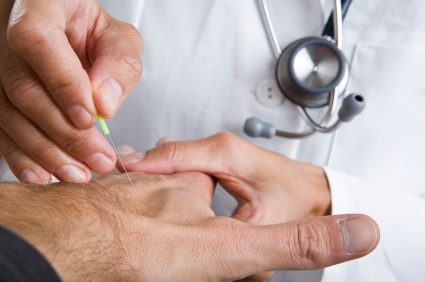The Science of Acupuncture
Few healthcare procedures today are more controversial and scrutinized than acupuncture. Many medical professionals and grateful patients swear by it, while others continue to question its efficacy and the science of acupuncture. In this article we will share some information and science that will help you understand its role in medicine as a whole.
Some Empirical Science of Acupuncture
A virtually painless procedure that involves placing thin needles in the skin at key places in the body, acupuncture originated in China and has been in use for more than 3,000 years. Just because something is ancient doesn't mean it's effective, of course, but in acupuncture's case it means we have a long  history of well-documented use to look at.
history of well-documented use to look at.
The Scrutiny
One of the key problems many skeptics have when it comes to acupuncture is that it developed based on the idea of chi or qi, the Chinese concept of "life energy." According to Traditional Chinese Medicine (TCM), this life energy flows along certain channels in the body. Placing acupuncture needles in the right places along these channels can help alleviate pain and other symptoms. Of course the main objective of TCM is to restore balance and overall health to the body by improving the energy's overall flow and relative balance between the channels.
Because this life energy isn't something that can be identified or measured using Western scientific techniques, the practice of acupuncture is dismissed out of hand by many of today's Western physicians.
But doing so ignores the fact that acupuncture is known to work, even if science can't explain exactly how.
Modern Studies and Science of Acupuncture
Acupuncture is being increasingly used and studied large and well-respected medical centers and teaching hospitals here in the US and around the world. It has been shown to be effective in pain management, in addressing side effects of treatments like chemotherapy, in treating depression, and in many other instances. Current research suggests that acupuncture stimulates the nervous system in a particular way that can interrupt pain signals and help improve other functions, achieving its effects not through a mystical life energy but rather through simple yet very real physical effects.
Of course, everything mystical is just science that isn't yet understood. Chinese physicians had plenty of evidence that acupuncture worked, they simply didn't have the tools to examine or explain the nervous system—a highly complex part of the body that we are still working to understand today. They saw that acupuncture, properly practiced, led to positive outcomes in their patients, and they developed an explanation for it.
We're only now beginning to rediscover just how effective acupuncture can be, and we're starting to answer the question of how it works, too, not by ignoring it but by practicing and studying it.
It's true that we might never find a measurable or identifiable "life energy" coursing through the body, and it's true that there are elements of Traditional Chinese Medicine that might be ineffective or even downright dangerous by today's medical standards. Dismissing acupuncture because it was built on less-than-perfect knowledge isn't very scientific, though, especially with all of the evidence there is to support the benefit it can bring to patients.
If acupuncture can help people hurt less, move more, and lead happier, healthier lives, without the ongoing expense and side-effects of pharmaceutical treatment options, we think it's a choice patients should be aware of.
If you're interested in learning more about acupuncture in Phoenix or scheduling an appointment, please contact us today.

















